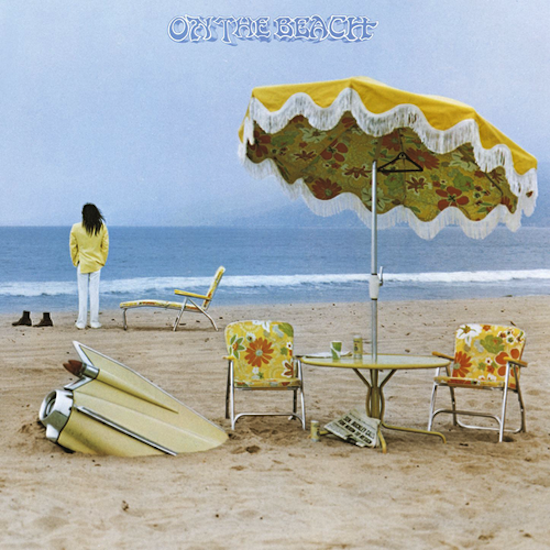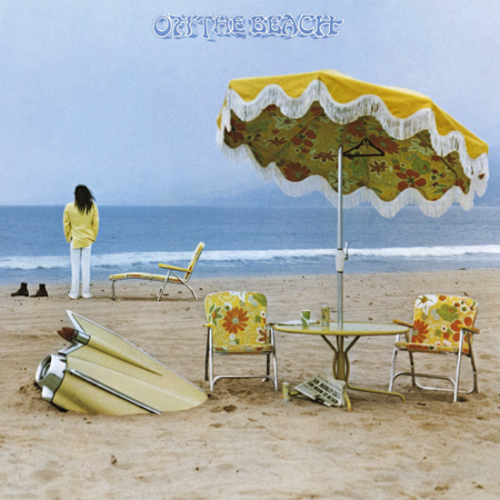In a curious twist of coincidence, I’m writing this anniversary piece not long after the release of a long-awaited live album culled from Crosby, Stills, Nash and Young’s legendary 1974 tour, which took place not long after On The Beach was released. Together, they encapsulate the creative and personal whirlwind that was Neil Young’s life as the seventies reached their midway point.
The CSNY tour represented in many ways the apex of Young’s commercial resonance amongst rock’s pantheon of giants. Two years earlier had seen the release of the smash hit Harvest, its delicate country-folk catchiness propelling the enigmatic Canadian to the top of the charts amid a wave of popular acclaim. His decision in 1969 to hook up with former Buffalo Springfield sparring pal Stephen Stills in CSNY, rock’s premier supergroup, had exposed his eccentric take on folk and rock to a wider audience, and Harvest represented an almost inevitable conclusion to that suddenly raised profile. Despite previous alternative success in the form of 1970’s After The Goldrush, Harvest propelled Young to the very top of the singer/songwriter pile, with rewards aplenty to boot.
Almost immediately, however, the dark side of fame took hold of Young’s life with a vice-like grip. As he prepared to embark on his biggest-yet tour in support of Harvest, his alter ego in his garage-rock band Crazy Horse, Danny Whitten, died of a heroin overdose mere hours after being fired from tour rehearsals by Young. The concerts went ahead under a cloud, with an increasingly alcohol-fuelled Neil finding himself at odds with his band and his audience, who couldn’t relate to the unhinged, hard-edged songs he took to hurling at them in lieu of Harvest-esque folk-pop. The tour was captured in all its lo-fi glory on Time Fades Away (still unavailable outside of its original vinyl pressing), which served as the first sign that Young was, in his words, "heading for the ditch".
In the space of a few months, the sunny* outlook of 1972 was erased completely. After Time Fades Away, Young – still grieving the death of Whitten, which was compounded by the similar demise of roadie Bruce Berry – took the remains of Crazy Horse and old stalwarts Nils Lofgren and Ben Keith into an improvised studio to lay down his first masterpiece of the dark recesses of the soul, Tonight’s The Night. Recording at night in a series of tequila-fueled sessions, TTN is bleary-eyed, barely in tune and totally phenomenal, perhaps all the more so because it can still shock CSNY and Harvest fans to the core. And if TTN was acclaimed by all involved as a cathartic experience, there was enough of its morbid malevolence still lurking in Young’s soul by the time the sessions for On The Beach came along in early 1974. As such, the trio of Time Fades Away, On The Beach and Tonight’s The Night (released tardily in 1975) remains one of the greatest and bleakest sequences of albums ever recorded by a major recording artist.
Just as Tonight’s The Night was guided – for want of a better word – by tequila, so too were the On The Beach sessions dominated by a rather different concoction. Ben Keith had introduced Young to a tubby and wild fiddle player called Rusty Kershaw and, while he only features on two songs, the latter’s influence, notably potent hash cakes named "honey slides", cast a rather woozy shadow over proceedings. Indeed, one of the producers would report to peering through the glass separating the booth from the recording space in a vain attempt to locate the musicians, such was the pall of smoke and darkness that hung over the protagonists. If the album’s title and gorgeous cover suggested a change from Tonight’s The Night‘s blackness, the sessions and what they produced were as gloomy as ever. With his relationship with actress Carrie Snodgress (the mother of his first child) in tatters and his booze and drug consumption increasingly rampant, Young poured out his angst and anger over the roughest, most sparse music in his career to date (yes, even more so than TTN).
Consequently, whilst it’s not as punishing as TTN, sonically, On The Beach is not for the faint of heart. The bouncy opener ‘Walk On’ aside, most of the album is given over to bitter musings on the emptiness of fame and relationship breakdowns. For the latter category, Young resurrected an old unreleased song, ‘See The Sky About To Rain’, recorded at snail’s pace and laced with funereal electric piano. ‘For The Turnstiles’, meanwhile, is just Young and Keith on banjo and dobro respectively, striving to sing in tune a cracked exposé of the stadium rock scene and ‘Vampire Blues’ points to another future favourite of Young’s bugbears: the destruction of the environment. This is Young at his most disillusioned, and his fury is distilled into raw viciousness on the third track of the first side, the apocalyptic ‘Revolution Blues’. Over an almost funky rhythmic backing provided by Rick Danko and Levon Helm of The Band (man I wish he’d played with them more often!), Young channels the spirit of Charles Manson, culminating in a harsh incantation: "I hear that Laurel Canyon/ Is full of famous staaaaaars/ But I hate them worse than lepers/ And I’ll kill them in their caaaaars!!!!" In any decade, even now, this would be seen as dark, even controversial stuff; coming from a huge star at the height of his fame in 1974, it could have been career suicide.
For all the first side’s excellence, though, the three tracks that make up side B of On The Beach, starting with the title track, possibly represent Neil Young at his absolute peak. ‘On The Beach’ is heart-rending blues played with absolute anguish as Young contemplates his collapsing world in unflinching detail: "Though my problems are meaningless/ That don’t make them go away". ‘Motion Pictures’ is another minimal dirge aimed as a last farewell to Snodgress, with Young’s world-weary voice accompanied simply by hand-patted drums, plonking bass and the occasional wurble from Kershaw’s slide guitar. Finally, the album comes tumbling to a close with exquisite emotional potency with the epic, blearily psychedelic song-poem that is ‘Ambulance Blues’, a strange voyage through Young’s past in Canada to his traumatised presence via a few meanderings into the realms of politics and music criticism.
Of all Young’s albums, On The Beach may be the hardest to describe musically, such is the way it sits between identifiable genres. It seems to have emerged, blinking but oddly full-formed, from the darkest chasms of Neil Young’s heart and mind, with Kershaw, Keith, bassist Tim Drummond, drummer Ralph Molina and the other guest performers layering sounds onto his vision and basic outlines with intuitive ease. Maybe honey slides generate telepathy. On The Beach wasn’t a commercial success, as audiences continued to be baffled by its sombreness, and it suffered the same fate as Time Fades Away until 2003 when it saw a belated CD and vinyl reissue, but it now has deservedly earned a place of true favour with Young aficionados. And to come back to CSNY, when Young brought the likes of ‘Ambulance Blues’ and ‘Revolution Blues’ to the almighty party, his erstwhile colleagues were beyond taken aback, with David Crosby begging off having to play on the latter. Yet, forty-five years down the line, I will find myself reaching for this unrelenting masterpiece far more often than Déjà Vu.
* For what it’s worth, a closer look at the lyrical content of Harvest shows considerable nuance in its supposed cheeriness. Yes, Young was in love and successful, but from the slightly wistful surrealism of ‘Out On The Weekend’ to the anti-racist rant that is ‘Alabama’, via the cautionary and slightly chilling ‘The Needle And The Damage Done’ and the title track’s Southern Gothic chill, Harvest is actually anything but a simple ray of James Taylor-esque sunshine. How could it be otherwise with Neil Young?



